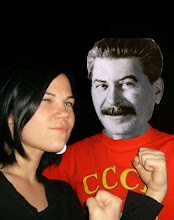You and your buddies are sitting around and talking about each others' work. Or maybe you're sitting behind a table at artist alley and some cutie high school artstar toddles up. Or you get an email from a friend about their unbelievably good new book. Ok kids- this can be uncomfortable as it can get. Each artist in the world can be a special snowflake kind of sensitive and you have no idea where their minefields are, but you don't want insult them with a shallow complement.
The idea here is to partner with the creator to help them see the good parts as well as possible solutions for weak areas. Unless you are a reviewer (who has an obligation to their readers to be blunt and entertaining) or and editor (who has an obligation to their readers and employers to quickly identify usable talent) the one and only goal is to help them make better comics.
An easy, non-confrontational formula for a critique:
1. Take a moment and really review what you are looking at as a whole. Make mental or written notes of anything that you like or that may have common root issues- like strange perspective or drawing goofy hands. Be able to back up everything you see with unemotional facts. Be ready to continue the conversation. Each point you bring up should begin a dialogue where the artist can feel free to process these points.
2. Say one general thing that you like about it and give a clear example. Such as, "I can see you are really studying anatomy. On the third panel, the tendons of the neck look very well observed."
3. Say one thing that you think could be improved. Once again, be very specific, explain why, and offer a possible solution: "In some parts the page construction feels a little rushed. Panels 3 and 4 have a strong tangent running between them. Tangents can be confusing to the reader. Some people find it helpful to use a mirror to catch these kinds of hard-to-see composition issues".
4. End on a positive note. Talk about another general good thing that you see. Talk about what direction they want to move in, who you think they maybe influenced by or who they might benefit from looking at. "I really like how much texture you give all the planes in this page. Have you ever had a chance to look at Ted McKeever? I think you might like his work."
Think of it as a sandwich- Two Positive things wrapped around something you are not so hot about.
You don't want to shut down a useful conversation and put the artist on the defensive. Negatively charged SUBJECTIVE descriptors like "hate", "crap", or "lazy" are pretty much ego fire, and also kind of dickish things to say anyway (even being right doesn't make you less of a dick). Tearing some kid a new asshole for their shitty art doesn't do anyone any good. The same goes for people who are much more advanced then yourself. Just because they are better doesn't mean you should ruin a useful critique by saying "oh but what do I know, I'm barely out of college."
We all want to see more great comics- part of that is lifting up artists to the next level- making ok artists good and good artist great. We can encourage better work by accepting that the comics medium is really a collection of fairly complicated, learnable skills. Things we can talk about. "Talent" at best is a jumping point and at worst used as a crutch when we don't want to move forward in our learned skills.
OK! Now if i could just figure out how to nicely tell people their script is totally not working for me.


No comments:
Post a Comment